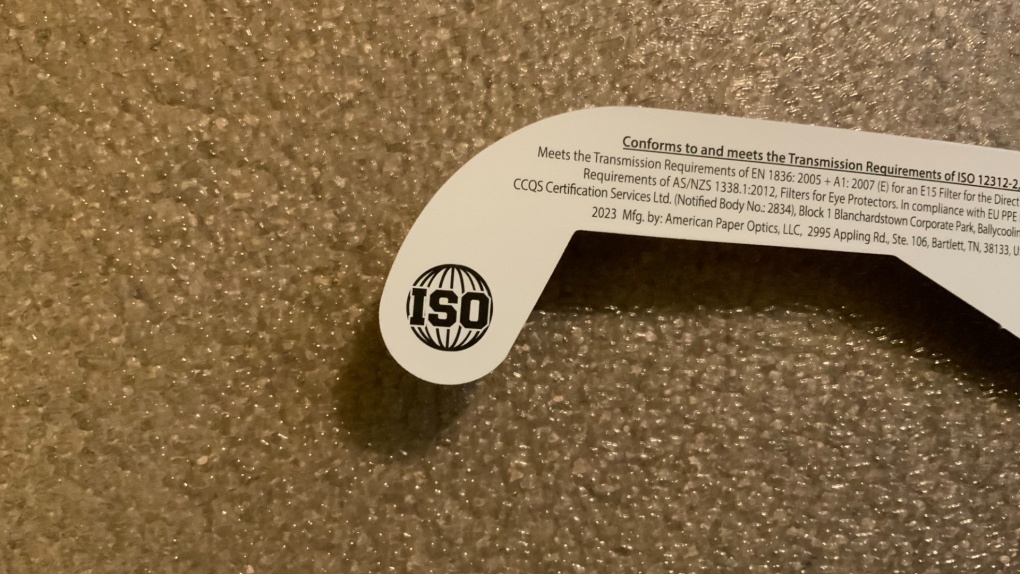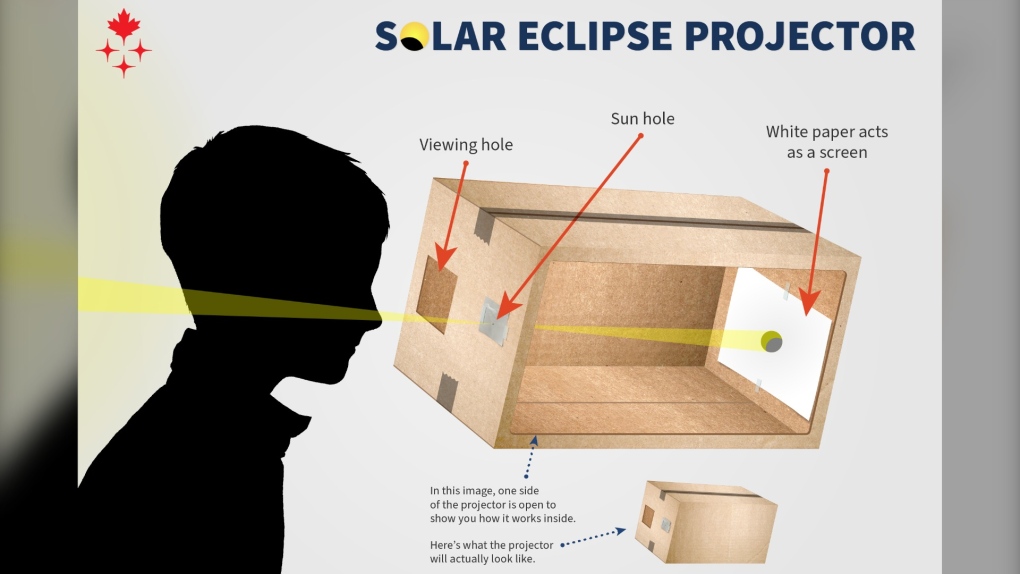Officials are reminding people of the dangers of looking directly at the sun during a solar eclipse as Ontario ramps up for the once-in-a-lifetime event on April 8.
Looking at the sun during a partial eclipse can have serious and irreversible damage unless you are protected by ISO-certified “solar eclipse glasses” or indirect means of looking at the sun.
“There’s always danger to look at the sun. When we look at the sun, the UV from the sun can be damaging to your eyes,” said Dr. Carla Yassa with the Barrhaven Optometric Centre.
“Those are super important to wear if you’re going to be looking at the solar eclipse just to protect your eyes and protect you from this damage,” she said.
Doctors are reminding residents of the potential irreversible effects associated with staring at the sun.
But not all solar eclipse glasses are made the same. Queen’s University is warning that some being sold online are counterfeit and do not stop enough sunlight to be safe.
“They have to be certified and it’s really important that they’re from a reputable source,” said Dr. Yi Ning Strube, a Pediatric Ophthalmologist with the Kingston Health Sciences Centre.
WHAT ARE SOLAR ECLIPSE GLASSES?
“These are not regular sunglasses,” said Gary Boyle, an astronomy educator and enthusiast known as ‘The Backyard Astronomer.’
“They’re only made to look at the sun, do not drive with them. And if you can’t even find the glasses, you can buy a number of 14 welder’s glasses, which does the same thing pretty well.”
Safe sun glasses must comply with the International Organization for Standardization’s certified glasses, labelled ISO-12312-2. The eclipse can be looked at directly without proper eye protection only when the moon completely obscures the sun’s bright face – during the brief and spectacular period known as totality.
Another way to indirectly look at the sun is to use a kitchen tool, such as a spaghetti colander or vegetable strainer.
“Just like the pinhole camera that you built in in school,” he said. “And in this case you’ll see 58 little semi circles at the moon.”
The Canadian Space Agency also provides instructions on how to create your own solar eclipse viewing device.
 Legitimate solar eclipse glasses should be marked with ISO certification. (Bryan Bicknell/CTV News London)
Legitimate solar eclipse glasses should be marked with ISO certification. (Bryan Bicknell/CTV News London)
Experts warn not to use a camera lens, telescope, binoculars or any other optical device that does not have a solar filter while wearing eclipse glasses. The concentrated solar rays can burn through the filter and cause serious eye injury.
Experts also recommend wearing sunscreen, a hat and protective clothing to prevent skin damage.
There are several recommendations online on where to find certified and reputable solar eclipse glasses.
CAN I GO BLIND IF I STARE DIRECTLY AT A SOLAR ECLIPSE?
Eclipse glasses should fit snugly enough so that wearers can shake their head without them falling off, according to Robert Cockcroft, an assistant professor at the department of physics and astronomy at McMaster University.
People who wear prescription glasses should make sure the solar lenses can fit underneath.
He says people may want to experiment wearing just eclipse glasses, and not their prescription lenses, if that makes them more secure on their face. People can put the filters on first before their glasses if it fully covers their eyes better..
NASA says the only safe time to look at the sun with the naked eye is during the brief phase of totality when the moon completely covers the sun.
“You’ll know it’s safe when you can no longer see any part of the sun through eclipse glasses or a solar viewer,” NASA says on its website.
“As soon as you see even a little bit of the bright sun reappear after totality, immediately put your eclipse glasses back on or use a handheld solar viewer to look at the sun.”
Experts says people who will only see a partial eclipse since they aren’t in the path of totality should not remove their eclipse glasses or proper eye protection.
 How to build your own eclipse projector (Canadian Space Agency).
How to build your own eclipse projector (Canadian Space Agency).
“While it is safe to view the eclipse during totality without eclipse glasses, most viewers in Canada are not located in a city where totality will be visible and should therefore keep their eclipse glasses on for the duration of the event to avoid the risk of solar retinopathy,” said Dr. Shaina Nensi, vice-president of the Ontario Association of Optometrists.
Those who are in a city within the path of totality should find out the time it will occur and how long it will last, she added.
If people expose their eyes to the sun without protection they could develop solar retinopathy, a condition in which the retina is damaged from looking directly at the sun or another bright light source.
Since retinas don’t have pain receptors, people won’t feel pain if they are damaged.
Retinopathy can lead to permanent or temporary blind spots, distortions to vision and the way people see colour, increased light sensitivity, eye pain and grittiness (or feeling like there is sand in your eye), and even complete blindness, Nensi explained.
Nensi recommends people see an optometrist immediately if they experience symptoms, even if they are mild. The symptoms can be irreversible, depending on how long the person stares at the eclipse, she said.
With files from CTVNews.ca